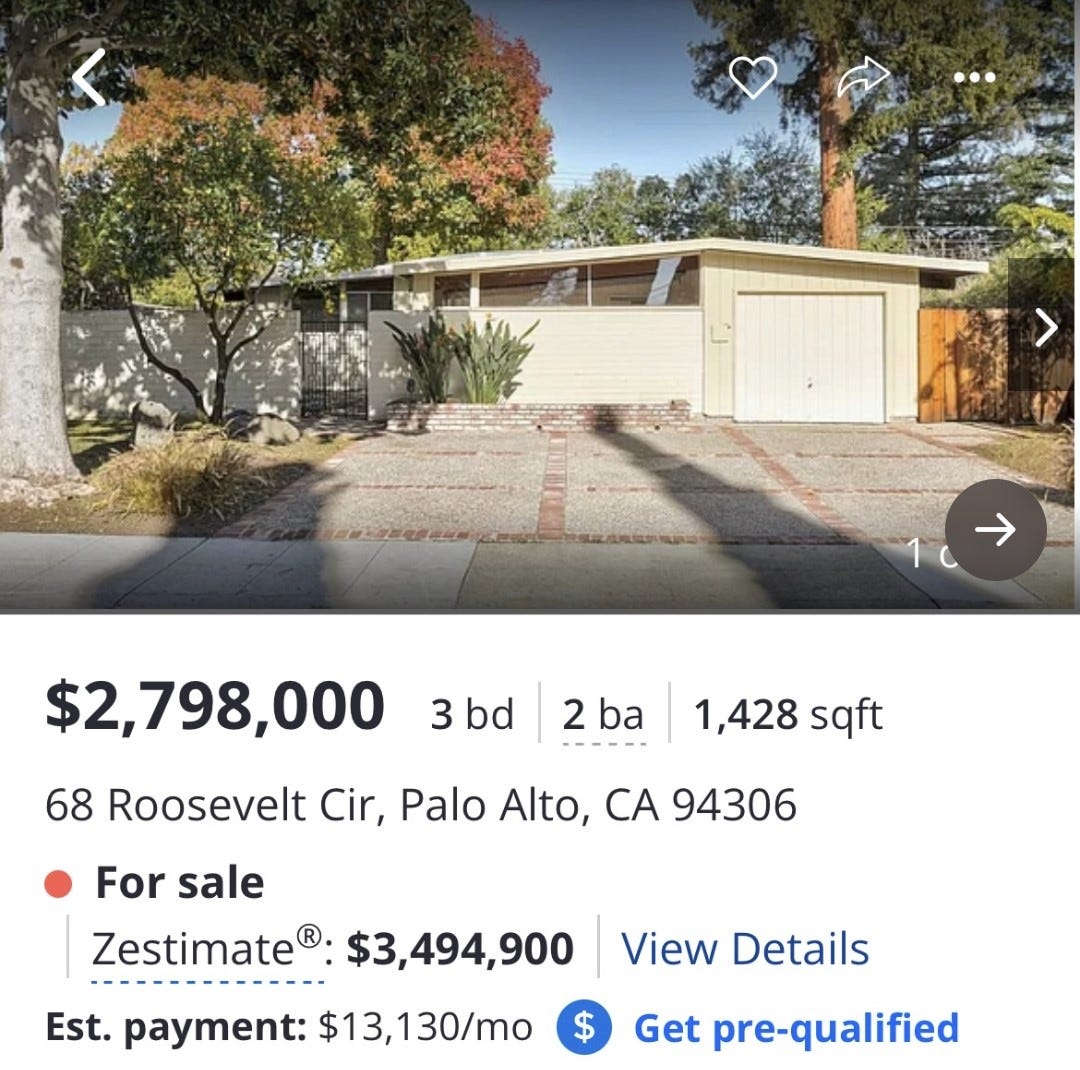The Deleted Scenes - Does Not Compute
A fellow on Twitter shared this house listing from Palo Alto, California a couple of days ago, which I screencapped. There are, for a comparison of sorts, dozens of houses for sale in Detroit that are cheaper than the estimated monthly payment on this house. I’ve seen photos showing dozens of people lined up waiting to view an open house, reports of homes selling for tens or even hundreds of thousands above asking price, and—of course—these real-estate listings from California’s Bay Area suburbs where decrepit shoebox ranch houses now about 70 years old go for $2 million, $3 million, or more. What does this actually mean? I’m not sure it means anything. The significance of these listings isn’t that the ranch house is really worth $3 million, or conversely that it needs new flooring or the kitchen needs to be completely remodeled. Such houses are teardowns, to be replaced by much larger, more modern, and even more expensive houses. Similarly, the houses for sale in Detroit for a few thousand dollars are not really worth $3,000 or $4,000. It isn’t exactly like you’d say, “Well, would you do $3,500?” At these kinds of extremes, prices stop communicating anything meaningful. What they’re trying to indicate is that the market thinks the land in outer Detroit is effectively worthless, while the land in Palo Alto is worth far, far more than what it’s currently being used for. The real significance of the $3 million shoebox (or of the inverted density curve) is the deep illness to which it points. This is not about blaming homeowners; it’s just that at a high level, it’s quite obvious that something has gone very wrong. That Palo Alto listing is nonsense. It’s a “does not compute” answer that the economy spits out when we try to suppress normal market forces. It’s the American equivalent of the stories about East Germans being able to buy nothing but pickled cabbage at the grocery store, or of their automakers producing cars so awful that they were actually worth less than the resources that went into them. Those were bits of “does not compute” nonsense that the real economy spit out, groaning under the weight of the communist planned economy. California housing prices—and those in other housing-crunched regions—are the “does not compute” effect of ours. The market is trying desperately to tell us, by spitting out such nonsense, that there are serious market failures and distortions at work. Namely, though maybe not exclusively, legacy zoning codes that have forcibly decoupled the housing market from the job market—which is to say, from the economy. The $3 million house is a patient on a stretcher gushing blood. When he gets wheeled into the emergency room, the doctors don’t stand around and make detached observations. “Hmm, stab wound two inches from the heart. That’s a lot of blood. If we plot a chart, we can estimate that in five minutes, the patient will have lost half his blood. That would mean a 50 percent decrease in the chance of surviving the wound. But we’re not quite certain. Maybe we should produce a working paper to study this further. Then, we’ll have to do a survey of the waiting room. Their comments should be due by COB, at which point we’ll….” That, however, is exactly what our thicket of land-use regulations forces us to do, no matter how absurd the status quo becomes. (If you don’t believe me, look what happened when a thrift store tried to lease a vacant box store in in Silver Spring, Maryland.) These places in California—and far less expensive, but still objectively very expensive places in my own region of Northern Virginia—are neighborhoods that were once middle class. They aren’t exclusive places; they aren’t Beverly Hills. The existence of expensive or even “luxury” neighborhoods isn’t the problem. The problem is that economic planning in the form of zoning has artificially turned thousands of once ordinary and affordable communities into de facto luxury communities. I received an interesting comment the other day on one of my other housing pieces. Here’s part of it:
I think the argument here is that it’s unfair to blame legacy homeowners in expensive mature suburbs (in my region, places like Arlington, Virginia or Takoma Park or parts of Silver Spring, Maryland) for the housing crisis. This reader perceives some of this commentary as an unfair attack on such homeowners and/or on these mature communities that are, in many respects, lovely and fine-grained neighborhoods. I agree with that to an extent—that extent being that I dislike the idea of treating mature, existing places as blank slates. I would not like to see large swaths of these older suburbs demolished for new development. But the fact is that these houses have tripled or quadruped in value, or more, and these communities, whatever their form and their history, are now effectively closed to the vast majority of metro-area residents. Forget affordable housing—an aging one-story house in a lovely inner suburb is out of reach even for many people with upper-middle-class incomes. The opinions, motives, or work ethic of those homeowners is more or less irrelevant. The irony is that liberalizing the zoning in these places would not necessarily change them dramatically. I wrote about this in a recent post:
My argument is not that anyone’s house should be taken away or demolished. It’s not that lucky homeowners are bad or selfish. It isn’t personal at all. It’s a higher-level argument. You simply have to liberalize land use and allow the market to operate more freely, because the status quo is unsustainable and absurd. Transitions are always hard, and will always disadvantage someone, but every day we’re disadvantaging the working class, increasingly the middle class, and eventually the whole metro-area economy. (Montgomery County, Maryland first lost people, and is now losing jobs, to its northern neighbor, Frederick County, where new development is plentiful and less expensive.) What will it cost to maintain thousands of acres of sprawling new development, 30 or 40 miles out from the urban core? Where will the city’s service workers, construction workers, and even young journalists or think-tankers live? Is it good policy to have entire metro regions where you increasingly must either choose a career or a family, but not both, because the numbers will never add up without family wealth? All of these outcomes do not compute. You might say they’re at least the devil we know. But they’re also the devil we’ve chosen. And like so many ersatz results of economic planning and tinkering, they can be largely stopped when we so choose, as well. Related Reading: Still Renting After All These Years Please consider upgrading to a paid subscription to help support this newsletter. You’ll get a weekend subscribers-only post, plus full access to the archive of nearly 300 posts and growing. And you’ll help ensure more material like this! You’re a free subscriber to The Deleted Scenes. For the full experience, become a paid subscriber. |
Older messages
Against Black Boxes
Tuesday, March 15, 2022
What if we want a little friction and inconvenience?
What is a Streetcar?
Saturday, March 12, 2022
Platonic thought experiment meets transportation mode
A Tale of Two Highways
Thursday, March 10, 2022
Central New Jersey showcases two very different kinds of linear development
A Universe of Uses
Thursday, March 10, 2022
What Do You Think You're Looking At? #48
Neon Killer
Tuesday, March 8, 2022
An art form became the scapegoat for bad land use
You Might Also Like
*This* Is How To Wear Skinny Jeans Like A Fashion Girl In 2025
Wednesday, March 12, 2025
The revival is here. The Zoe Report Daily The Zoe Report 3.11.2025 This Is How To Wear Skinny Jeans Like A Fashion Girl In 2025 (Style) This Is How To Wear Skinny Jeans Like A Fashion Girl In 2025 The
The Best Thing: March 11, 2025
Tuesday, March 11, 2025
The Best Thing is our weekly discussion thread where we share the one thing that we read, listened to, watched, did, or otherwise enjoyed recent… ͏ ͏ ͏ ͏ ͏ ͏ ͏ ͏ ͏ ͏ ͏ ͏ ͏ ͏ ͏ ͏ ͏ ͏ ͏ ͏ ͏ ͏ ͏ ͏ ͏ ͏ ͏ ͏
The Most Groundbreaking Beauty Products Of 2025 Are...
Tuesday, March 11, 2025
Brands are prioritizing innovation more than ever. The Zoe Report Beauty The Zoe Report 3.11.2025 (Beauty) The 2025 TZR Beauty Groundbreakers Awards (Your New Holy Grail Or Two) The 2025 TZR Beauty
Change Up #Legday With One of These Squat Variations
Tuesday, March 11, 2025
View in Browser Men's Health SHOP MVP EXCLUSIVES SUBSCRIBE Change Up #Legday With One of These Squat Variations Change Up #Legday With One of These Squat Variations The lower body staple is one of
Kylie Jenner Wore The Spiciest Plunging Crop Top While Kissing Timothée Chalamet
Tuesday, March 11, 2025
Plus, Amanda Seyfried opens up about her busy year, your daily horoscope, and more. Mar. 11, 2025 Bustle Daily Amanda Seyfried at the Tory Burch Fall RTW 2025 fashion show as part of New York Fashion
Paris Fashion Week Is Getting Interesting Again
Tuesday, March 11, 2025
Today in style, self, culture, and power. The Cut March 11, 2025 PARIS FASHION WEEK Fashion Is Getting Interesting Again Designs at Paris Fashion Week once again reflect the times with new aesthetics,
Your dinner table deserves to be lazier
Tuesday, March 11, 2025
NY delis are serving 'Bird Flu Bailout' sandwiches.
Sophie Thatcher Lets In The Light
Tuesday, March 11, 2025
Plus: Chet Hanks reaches new heights on Netflix's 'Running Point.' • Mar. 11, 2025 Up Next Your complete guide to industry-shaping entertainment news, exclusive interviews with A-list
Mastering Circumstance
Tuesday, March 11, 2025
“If a man does not master his circumstances then he is bound to be mastered by them.” ͏ ͏ ͏ ͏ ͏ ͏ ͏ ͏ ͏ ͏ ͏ ͏ ͏ ͏ ͏ ͏ ͏ ͏ ͏ ͏ ͏ ͏ ͏ ͏ ͏ ͏ ͏ ͏ ͏ ͏ ͏ ͏ ͏ ͏ ͏ ͏ ͏ ͏ ͏ ͏ ͏ ͏ ͏ ͏ ͏ ͏ ͏ ͏ ͏ ͏ ͏ ͏ ͏ ͏ ͏ ͏ ͏ ͏
Don't Fall for This Parking Fee Scam Text 🚨
Tuesday, March 11, 2025
How I Use the 'One in, One Out' Method for My Finances. You're not facing any fines. Not displaying correctly? View this newsletter online. TODAY'S FEATURED STORY Don't Fall for the

